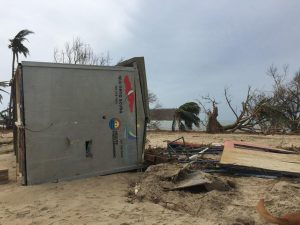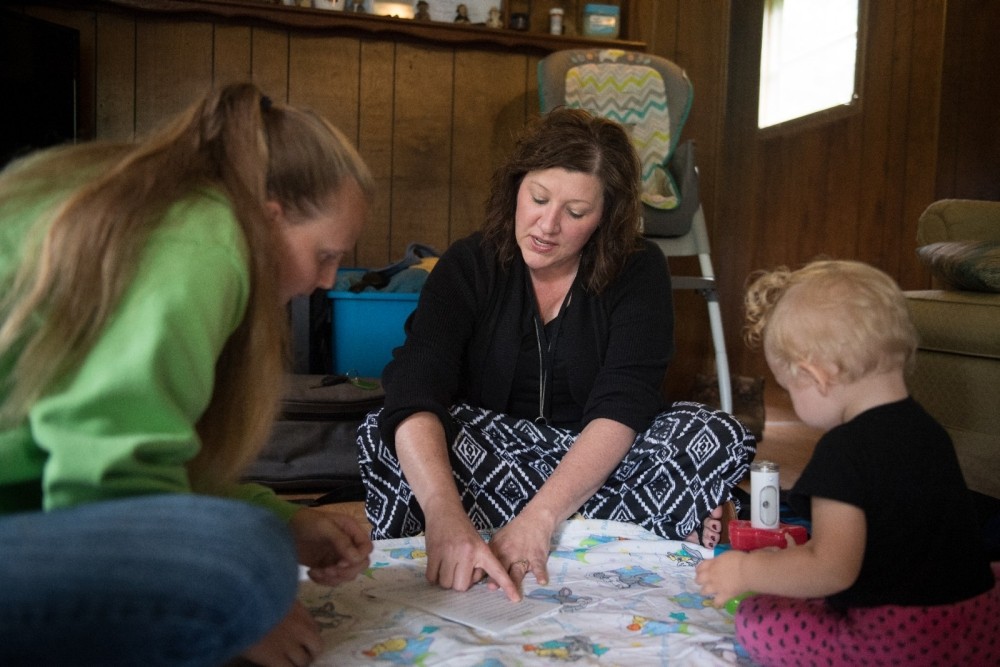It was April and snowing when Aura Broida Fontánez came to West Virginia, and there were no leaves on the trees.
It reminded her of the trees in Puerto Rico, when the leaves were swept away by Hurricane Maria.
Months after the hurricane, Broida arrived as an intern at Harmony Farm, a 5-acre farm in Morgantown that grows around 60 different crops, such as tomatoes and microgreens.
She met the farm’s owner, Sky Harman, at a community garden in Vieques, an island around 8 miles east of mainland Puerto Rico. After the hurricane, Harman flew in with the Climate Justice Alliance and Organización Boricuá to repair and rebuild farms across Puerto Rico. Broida lived on Vieques when both Hurricane Irma and Hurricane Maria hit in September 2017.
Now, they both work on the Morgantown farm. Broida is learning to be a farmer, a job she started wanting due to the lack of fresh food in Puerto Rico, especially following the hurricanes.

“It’s a large learning curve, but she’s doing really well,” Harman said.
One of the first adjustments she had to make was to the weather.
“I was not mentally prepared for how cold it was. I was surprised at the snow,” Broida said. Puerto Rico has no winter, only a dry season and a wet season.
As West Virginia grew warmer, and the leaves returned, Broida found herself surrounded by more and more fresh food. Her work varies by the day. She does things like weeding, fertilizing, mowing and planting. She also participates in the Bridgeport and Morgantown farmers markets.
“I feel like I am learning quite a bit, like [about] the rhythm of a larger food production system,” Broida said.
In September, she left behind her house to stay with the owners of Villa Coral Guesthouse, a business where she had worked at the front desk. Their home, in a different part of Vieques, was better suited to withstand hurricanes, Broida said.
Before Maria, Broida helped with preparations, what she called “hurricane chores.” When Hurricane Irma struck two weeks before, Broida said it swung mostly north of the island.
Broida said she was grateful for that first storm. It helped prepare them for the larger one to follow.
On the morning of Sept. 19, 2017, Hurricane Maria was only a breeze. At around 8 p.m., Broida said, the storm fully hit.
The storm shutters prevented Broida from seeing the storm, but she could hear it.
“It’s like rain is coming down in sheets,” she said. “I was sleeping, but I was having nightmares because of all the sound. Every once in a while, you could hear something crashing. Most of the time it was trees. Afterwards, we realized it was also electrical poles and stuff crashing on top of cars or stuff breaking.”
Mireya Padín Nadal, the owner of Villa Coral, credited Broida with helping before, during and after the hurricane.
Padín said Broida helped do things like put up storm shutters before Maria hit. During the storm, she helped roll furniture to block doors, and helped when wind forced water through the storm shutters. Afterwards, she collected food and water and cleared trees.
“She was our one and only person we could definitely rely on,” Padín said. “She was the backbone of helping keep everything together.”
Padín’s business still does not have a working landline phone. Power did not come back to the guest house until late February. Padín’s home received power in March. They didn’t have running water for around a month, and then it was available off and on.
Broida’s own home, which she was caretaking for a friend, was damaged by the hurricane. The windows were broken, the inside damaged by wind and water. Another house, which she had been planning to soon rent, fell in on itself. Without phone reception, she was unable to contact her mother, who lived on the mainland.
Still, she helped others in Vieques. She did work for a governmental administration addressing mental health following the hurricanes. She worked at kitchens making food for those in need, she put up tarps, cleaned yards and houses, and worked at the community garden, where she met Harman.
Broida expressed an interest in farming to Harman, and Harman told her about his farm’s internship program.
“That’s how farming goes,” Harman said about the encounter that led Broida to his farm. “It’s a serendipitous kind of activity where you meet a lot of interesting people who find common ground and can work together to build a better future.”
Her internship ends in November. Broida said she’s not sure if she will stay another season in West Virginia, or work and learn at farms in other countries, like Cuba or Peru.
For now, Broida is enjoying West Virginia. She’s gone swimming in Cheat Lake, hiked at Coopers Rock and plans to explore the bike trails of West Virginia University’s Arboretum.
“I’m enjoying seeing all of the different blooms and getting to know the birds,” Broida said.
This article was originally published by the Charleton Gazette-Mail.



